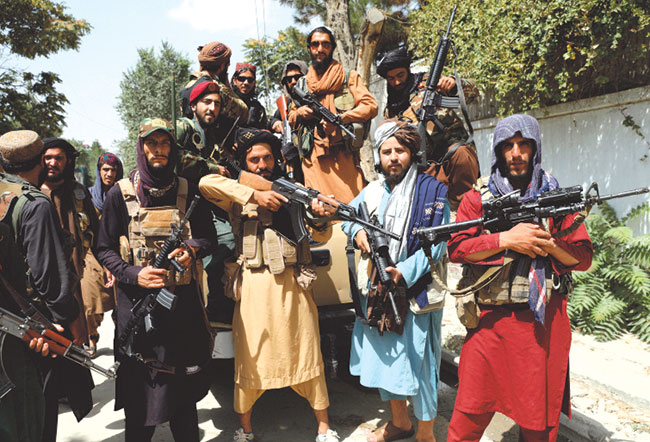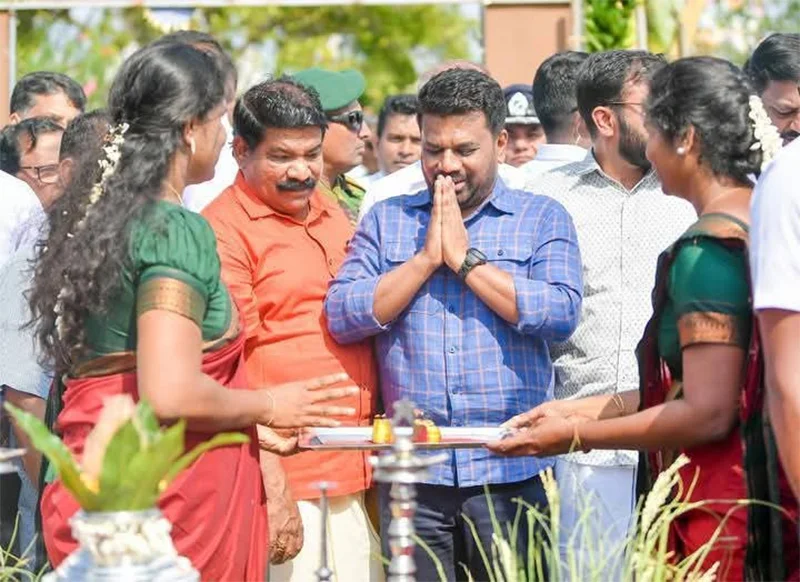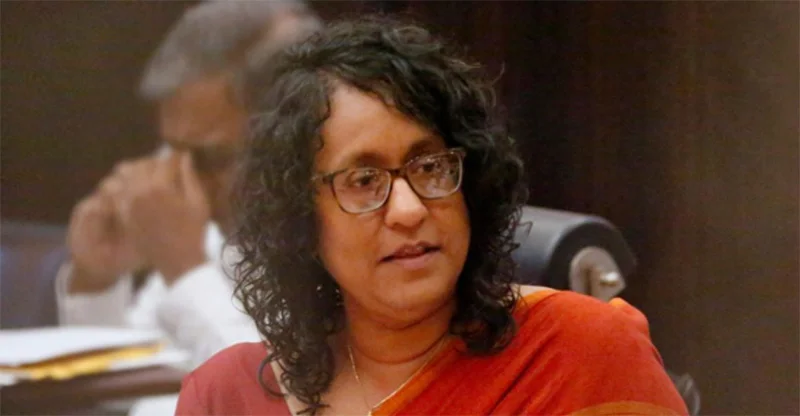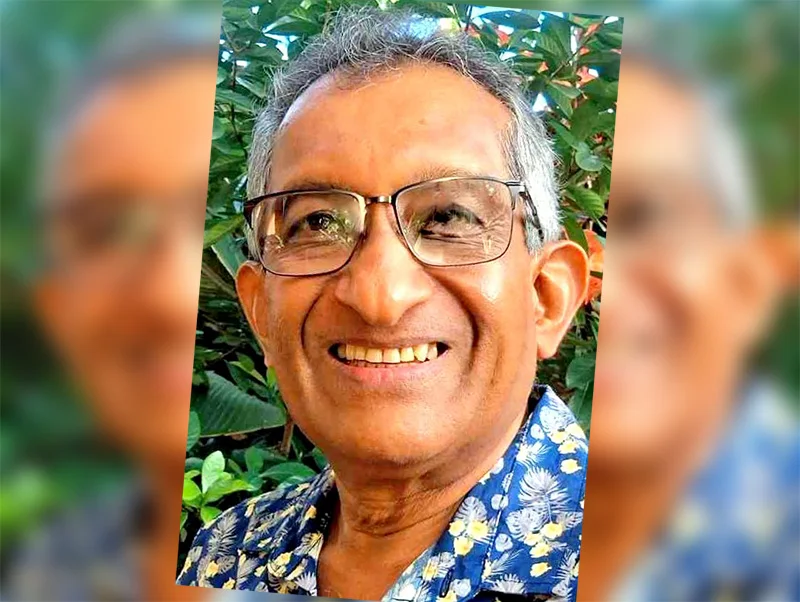Features
Power and sovereignty issues come to the fore in Afghanistan

“More and more strength to those women and other vulnerable groups that are mustering for their rights in Afghanistan right now.” This is likely to be the wish of progressives everywhere. The enormity of their courage could be gauged from the fact that they are in direct confrontation with the Taliban who are no champions of fundamental rights. Now more than ever before, women’s organizations the world over and international progressive opinion need to rally round these protesting sections in Afghanistan.
Such support is crucial in consideration of the fact that sovereignty-linked questions are coming to the fore in Afghanistan in the wake of the Taliban’s return to the country as rulers, thanks to the US’s scruples over withdrawing from Afghanistan regardless of the human costs it entailed. As pointed out in this column last week under the heading, “US-China Cold War intensifies in the wake of Taliban return”, countries are not obliged to scramble to accord recognition to the Taliban regime in view of the fact that it did not come to power through democratic processes.
This rule applies in particular to countries of the South and South West Asian regions that are claiming democratic credentials. This is in consideration of the fact that it is the countries of these regions that would be interacting most closely with the Taliban regime from now on. As said in last week’s column, those countries claiming to be democratic that do recognize the Taliban regime currently run the risk of exposing themselves as fake democracies.
However, the Taliban could gain some legitimacy by first forming an inclusive government and by thereafter going for a free and fair election, where the onus would be on the Taliban to prove that the majority of the Afghan people are supportive of it. In the absence of these basic requirements there is no way in which the militant organization could claim that it is the legitimate government of Afghanistan. Power to rule or sovereignty cannot flow from the barrel of a gun in the world of democracy. Accordingly, the Taliban lacks the sovereign right to rule right now.
 In this connection, it was most intriguing to hear a Sri Lankan “expert” going on record as saying, among other things, that an effort by Sri Lanka to recognize the Taliban regime “could give a wrong signal to both the Tamil and Muslim communities in Sri Lanka as well as the international community”. No explanation has been given by the speaker as to what this “signal” is. Besides, it is both daft and dangerous to refer to communities in their totality in consideration of the fact it is only microscopic armed formations within the communities in question that have opted for armed militancy against the Lankan state.
In this connection, it was most intriguing to hear a Sri Lankan “expert” going on record as saying, among other things, that an effort by Sri Lanka to recognize the Taliban regime “could give a wrong signal to both the Tamil and Muslim communities in Sri Lanka as well as the international community”. No explanation has been given by the speaker as to what this “signal” is. Besides, it is both daft and dangerous to refer to communities in their totality in consideration of the fact it is only microscopic armed formations within the communities in question that have opted for armed militancy against the Lankan state.
As commonsense would dictate, the vast majority of the members of the relevant communities are living in peace with the rest of the Sri Lankan people. Such “experts” should restrain their tongues lest they aggravate Sri Lanka’s ethnic and religious tensions.
Meanwhile, the US withdrawal from Afghanistan has opened a power vacuum in South West Asia. The possibility is strong of China filling this vacuum before long but that could have India in particular worried. This accounts for India making diplomatic contact with some members of the Taliban leadership in Doha recently. India is compelled to strike some sort of working relationship with the Taliban on account of its need, among other reasons, to ensure that China does not warm up excessively towards the Taliban. As a principal state of the South and South West Asian regions, India is facing the challenge of staving off moves by another notable world power in the form of China to infiltrate the regions concerned.
Given its instability, Afghanistan would be exceptionally coveted by China since external economic assistance would be high on the Taliban’s foreign policy agenda. Such moves by China would compel India to redouble its efforts to go to Afghanistan’s assistance in the area of nation rebuilding in particular. Accordingly, India and China would be in a degree of intense competition to wield influence in Afghanistan in the days ahead.
US military incursion into the global South has, no doubt, been a principal trigger to intensified conflict and war in the hemisphere over the decades but such armed involvement has been only one principal trigger in the chronic instability of these invaded states. With regard to South and South West Asia in particular the observer is obliged to come to grips with the extremely slow pace of progressive political change in these countries. Specifically, democratic development has been notoriously snail-paced. It is these realities that should have the democratic world worried in relation to the Taliban return.
An interesting poser that surfaces at the moment is what formations of the powerful, such as the G7, would be doing in the days ahead with regard to developments in Afghanistan. For instance, would the grouping be attaching strings, such as the adherence to democratic principles by the Taliban, for the extension of economic assistance to Afghanistan. The G7 would need to hurry because, besides China, other notable powers, such as Russia, Iran and Pakistan, would be redoubling their efforts to bolster the Taliban regime. Accordingly, big power games in Afghanistan are unlikely to end in a hurry. As pointed out in this column on previous occasions, Afghanistan’s strategic location has been making her the cynosure of the eyes of the powerful over the decades. This interest cannot be expected to dim in the foreseeable future.
Equally interestingly, how would the foremost agencies of the UN be reacting to developments in Afghanistan? Would the Taliban be expected to tread the path of democracy as a condition for crucial UN development assistance? What would be the stance of the UN Security Council members to these events? Could they muster a united policy among themselves on Afghanistan? Would Afghanistan be allowed by them to drift in the direction of Myanmar?
These questions and more cry out for answers. The hope of most progressives is likely to be that the wellbeing of the Afghan people would be attached top most priority by all the relevant stakeholders. That is, the legitimate interests of the powerless majority in Afghanistan should be made to prevail over all else.
Features
Ethnic-related problems need solutions now

In the space of 15 months, President Anura Kumara Dissanayake has visited the North of the country more than any other president or prime minister. These were not flying visits either. The president most recent visit to Jaffna last week was on the occasion of Thai Pongal to celebrate the harvest and the dawning of a new season. During the two days he spent in Jaffna, the president launched the national housing project, announced plans to renovate Palaly Airport, to expedite operations at the Kankesanthurai Port, and pledged once again that racism would have no place in the country.
There is no doubt that the president’s consistent presence in the north has had a reassuring effect. His public rejection of racism and his willingness to engage openly with ethnic and religious minorities have helped secure his acceptance as a national leader rather than a communal one. In the fifteen months since he won the presidential election, there have been no inter community clashes of any significance. In a country with a long history of communal tension, this relative calm is not accidental. It reflects a conscious political choice to lower the racial temperature rather than inflame it.
But preventing new problems is only part of the task of governing. While the government under President Dissanayake has taken responsibility for ensuring that anti-minority actions are not permitted on its watch, it has yet to take comparable responsibility for resolving long standing ethnic and political problems inherited from previous governments. These problems may appear manageable because they have existed for years, even decades. Yet their persistence does not make them innocuous. Beneath the surface, they continue to weaken trust in the state and erode confidence in its ability to deliver justice.
Core Principle
A core principle of governance is responsibility for outcomes, not just intentions. Governments do not begin with a clean slate. Governments do not get to choose only the problems they like. They inherit the state in full, with all its unresolved disputes, injustices and problemmatic legacies. To argue that these are someone else’s past mistakes is politically convenient but institutionally dangerous. Unresolved problems have a habit of resurfacing at the most inconvenient moments, often when a government is trying to push through reforms or stabilise the economy.
This reality was underlined in Geneva last week when concerns were raised once again about allegations of sexual abuse that occurred during the war, affecting both men and women who were taken into government custody. Any sense that this issue had faded from international attention was dispelled by the release of a report by the Office of the Human Rights High Commissioner titled “Sri Lanka: Report on conflict related sexual violence”, dated 13.01.26. Such reports do not emerge in a vacuum. They are shaped by the absence of credible domestic processes that investigate allegations, establish accountability and offer redress. They also shape international perceptions, influence diplomatic relationships and affect access to cooperation and support.
Other unresolved problems from the past continue to fester. These include the continued detention of Tamil prisoners under the Prevention of Terrorism Act, in some cases for many years without conclusion, the failure to return civilian owned land taken over by the military during the war, and the fate of thousands of missing persons whose families still seek answers. These are not marginal issues even when they are not at the centre stage. They affect real lives and entire communities. Their cumulative effect is corrosive, undermining efforts to restore normalcy and rebuild confidence in public institutions.
Equal Rights
Another area where delay will prove costly is the resettlement of Malaiyaha Tamil communities affected by the recent cyclone in the central hills, which was the worst affected region in the country. Even as President Dissanayake celebrated Thai Pongal in Jaffna to the appreciation of the people there, Malaiyaha Tamils engaged in peaceful campaigns to bring attention to their unresolved problems. In Colombo at the Liberty Roundabout, a number of them gathered to symbolically celebrate Thai Pongal while also bringing national attention to the issues of their community, in particular the problem of displacement after the cyclone.
The impact of the cyclone, and the likelihood of future ones under conditions of climate change, make it necessary for the displaced Malaiyaha Tamils to be found new places of residence. This is also an opportunity to tackle the problem of their landlessness in a comprehensive manner and make up for decades if not two centuries of inequity.
Planning for relocation and secure housing is good governance. This needs to be done soon. Climate related disasters do not respect political timetables. They punish delay and indecision. A government that prides itself on system change cannot respond to such challenges with temporary fixes.
The government appears concerned that finding new places for the Malaiyaha Tamil people to be resettled will lead to land being taken away from plantation companies which are said to be already struggling for survival. Due to the economic crisis the country has faced since it went bankrupt in 2022, the government has been deferential to the needs of company owners who are receiving most favoured treatment. As a result, the government is contemplating solutions such as high rise apartments and townhouse style housing to minimise the use of land.
Such solutions cannot substitute for a comprehensive strategy that includes consultations with the affected population and addresses their safety, livelihoods and community stability.
Lose Trust
Most of those who voted for the government at the last elections did so in the hope that it would bring about system change. They did not vote for the government to reinforce the same patterns that the old system represented. At its core, system change means rebalancing priorities. It means recognising that economic efficiency without social justice is a short-term gain with long-term costs. It means understanding that unresolved ethnic grievances, unaddressed wartime abuses and unequal responses to disaster will eventually undermine any development programme, no matter how well designed. Governance that postpones difficult decisions may buy time, but lose trust.
The coming year will therefore be decisive. The government must show that its commitment to non racism and inclusion extends beyond conflict prevention to conflict resolution. Addressing conflict related abuses, concluding long standing detentions, returning land, accounting for the missing and securing dignified resettlement for displaced communities are not distractions from the government programme. They are central to it. A government committed to genuine change must address the problems it inherited, or run the risk of being overwhelmed when those problems finally demand settlement.
by Jehan Perera
Features
Education. Reform. Disaster: A Critical Pedagogical Approach

 This Kuppi writing aims to engage critically with the current discussion on the reform initiative “Transforming General Education in Sri Lanka 2025,” focusing on institutional and structural changes, including the integration of a digitally driven model alongside curriculum development, teacher training, and assessment reforms. By engaging with these proposed institutional and structural changes through the parameters of the division and recognition of labour, welfare and distribution systems, and lived ground realities, the article develops a critical perspective on the current reform discourse. By examining both the historical context and the present moment, the article argues that these institutional and structural changes attempt to align education with a neoliberal agenda aimed at enhancing the global corporate sector by producing “skilled” labour. This agenda is further evaluated through the pedagogical approach of socialist feminist scholarship. While the reforms aim to produce a ‘skilled workforce with financial literacy,’ this writing raises a critical question: whose labour will be exploited to achieve this goal? Why and What Reform to Education
This Kuppi writing aims to engage critically with the current discussion on the reform initiative “Transforming General Education in Sri Lanka 2025,” focusing on institutional and structural changes, including the integration of a digitally driven model alongside curriculum development, teacher training, and assessment reforms. By engaging with these proposed institutional and structural changes through the parameters of the division and recognition of labour, welfare and distribution systems, and lived ground realities, the article develops a critical perspective on the current reform discourse. By examining both the historical context and the present moment, the article argues that these institutional and structural changes attempt to align education with a neoliberal agenda aimed at enhancing the global corporate sector by producing “skilled” labour. This agenda is further evaluated through the pedagogical approach of socialist feminist scholarship. While the reforms aim to produce a ‘skilled workforce with financial literacy,’ this writing raises a critical question: whose labour will be exploited to achieve this goal? Why and What Reform to Education
In exploring why, the government of Sri Lanka seeks to introduce reforms to the current education system, the Prime Minister and Minister of Education, Higher Education, and Vocational Education, Dr. Harini Amarasuriya, revealed in a recent interview on 15 January 2026 on News First Sri Lanka that such reforms are a pressing necessity. According to the philosophical tradition of education reform, curriculum revision and prevailing learning and teaching structures are expected every eight years; however, Sri Lanka has not undertaken such revisions for the past ten years. The renewal of education is therefore necessary, as the current system produces structural issues, including inequality in access to quality education and the need to create labour suited to the modern world. Citing her words, the reforms aim to create “intelligent, civil-minded citizens” in order to build a country where people live in a civilised manner, work happily, uphold democratic principles, and live dignified lives.
Interpreting her narrative, I claim that the reform is intended to produce, shape, and develop a workforce for the neoliberal economy, now centralised around artificial intelligence and machine learning. My socialist feminist perspective explains this further, referring to Rosa Luxemburg’s reading on reforms for social transformation. As Luxemburg notes, although the final goal of reform is to transform the existing order into a better and more advanced system: The question remains: does this new order truly serve the working class? In the case of education, the reform aims to transform children into “intelligent, civil-minded citizens.” Yet, will the neoliberal economy they enter, and the advanced technological industries that shape it, truly provide them a better life, when these industries primarily seek surplus profit?
History suggests otherwise. Sri Lanka has repeatedly remained at the primary manufacturing level within neoliberal industries. The ready-made garment industry, part of the global corporate fashion system, provides evidence: it exploited both manufacturing labourers and brand representatives during structural economic changes in the 1980s. The same pattern now threatens to repeat in the artificial intelligence sector, raising concerns about who truly benefits from these education reforms
That historical material supports the claim that the primary manufacturing labour for the artificial intelligence industry will similarly come from these workers, who are now being trained as skilled employees who follow the system rather than question it. This context can be theorised through Luxemburg’s claim that critical thinking training becomes a privileged instrument, alienating the working class from such training, an approach that neoliberalism prefers to adopt in the global South.
Institutional and Structural Gaps
Though the government aims to address the institutional and structural gaps, I claim that these gaps will instead widen due to the deeply rooted system of uneven distribution in the country. While agreeing to establish smart classrooms, the critical query is the absence of a wide technological welfare system across the country. From electricity to smart equipment, resources remain inadequate, and the government lags behind in taking prompt initiative to meet these requirements.
This issue is not only about the unavailability of human and material infrastructure, but also about the absence of a plan to restore smart normalcy after natural disasters, particularly the resumption of smart network connections. Access to smart learning platforms, such as the internet, for schoolchildren is a high-risk factor that requires not only the monitoring of classroom teachers but also the involvement of the state. The state needs to be vigilant of abuses and disinformation present in the smart-learning space, an area in which Sri Lanka is still lagging. This concern is not only about the safety of children but also about the safety of women. For example, the recent case of abusive image production via Elon Musk’s AI chatbox, X, highlights the urgent need for a legal framework in Sri Lanka.
Considering its geographical location, Sri Lanka is highly vulnerable to natural disasters, the frequency in which they occur, increasing, owing to climate change. Ditwah is a recent example, where villages were buried alive by landslides, rivers overflowed, and families were displaced, losing homes that they had built over their lifetimes. The critical question, then, is: despite the government’s promise to integrate climate change into the curriculum, how can something still ‘in the air ‘with climate adaptation plans yet to be fully established, be effectively incorporated into schools?
Looking at the demographic map of the country, the expansion of the elderly population, the dependent category, requires attention. Considering the physical and psychological conditions of this group, fostering “intelligent, civic-minded” citizens necessitates understanding the elderly not as a charity case but as a human group deserving dignity. This reflects a critical reading of the reform content: what, indeed, is to be taught? This critical aspect further links with the next section of reflective of ground reality.
Reflective Narrative of Ground Reality
Despite the government asserting that the “teacher” is central to this reform, critical engagement requires examining how their labour is recognised. In Sri Lanka, teachers’ work has long been tied to social recognition, both utilised and exploited, Teachers receive low salaries while handling multiple roles: teaching, class management, sectional duties, and disciplinary responsibilities.
At present, a total teaching load is around 35 periods a week, with 28 periods spent in classroom teaching. The reform adds continuous assessments, portfolio work, projects, curriculum preparation, peer coordination, and e-knowledge, to the teacher’s responsibilities. These are undeclared forms of labour, meaning that the government assigns no economic value to them; yet teachers perform these tasks as part of a long-standing culture. When this culture is unpacked, the gendered nature of this undeclared labour becomes clear. It is gendered because the majority of schoolteachers are women, and their unpaid roles remain unrecognised. It is worth citing some empirical narratives to illustrate this point:
“When there was an extra-school event, like walks, prize-giving, or new openings, I stayed after school to design some dancing and practice with the students. I would never get paid for that extra time,” a female dance teacher in the Western Province shared.
I cite this single empirical account, and I am certain that many teachers have similar stories to share.
Where the curriculum is concerned, schoolteachers struggle to complete each lesson as planned due to time constraints and poor infrastructure. As explained by a teacher in the Central Province:
“It is difficult to have a reliable internet connection. Therefore, I use the hotspot on my phone so the children can access the learning material.”
Using their own phones and data for classroom activities is not part of a teacher’s official duties, but a culture has developed around the teaching role that makes such decisions necessary. Such activities related to labour risks further exploitation under the reform if the state remains silent in providing the necessary infrastructure.
Considering that women form the majority of the teaching profession, none of the reforms so far have taken women’s health issues seriously. These issues could be exacerbated by the extra stress arising from multiple job roles. Many female teachers particularly those with young children, those in peri- or post-menopause stages of their life, or those with conditions like endometriosis may experience aggravated health problems due to work-related stress intensified by the reform. This raises a critical question: what role does the state play in addressing these issues?
In Conclusion
The following suggestions are put forward:
First and foremost, the government should clearly declare the fundamental plan of the reform, highlighting why, what, when, and how it will be implemented. This plan should be grounded in the realities of the classroom, focusing on being child-centred and teacher-focused.
Technological welfare interventions are necessary, alongside a legal framework to ensure the safety and security of accessing the smart, information-centred world. Furthermore, teachers’ labour should be formally recognised and assigned economic value. Currently, under neoliberal logic, teachers are often left to navigate these challenges on their own, as if the choice is between survival or collapse.
Aruni Samarakoon teaches at the Department of Public Policy, University of Ruhuna
Kuppi is a politics and pedagogy happening on the margins of the lecture hall that parodies, subverts, and simultaneously reaffirms social hierarchies.
By Aruni Samarakoon
Features
Smartphones and lyrics stands…

 Diliup Gabadamudalige is, indeed, a maestro where music is concerned, and this is what he had to say, referring to our Seen ‘N’ Heard in The Island of 6th January, 2026, and I totally agree with his comments.
Diliup Gabadamudalige is, indeed, a maestro where music is concerned, and this is what he had to say, referring to our Seen ‘N’ Heard in The Island of 6th January, 2026, and I totally agree with his comments.
Diliup: “AI avatars will take over these concerts. It will take some time, but it surely will happen in the near future. Artistes can stay at home and hire their avatar for concerts, movies, etc. Lyrics and dance moves, even gymnastics can be pre-trained”.
Yes, and that would certainly be unsettling as those without talent will make use of AI to deceive the public.
Right now at most events you get the stage crowded with lyrics stands and, to make matters even worse, some of the artistes depend on the smartphone to put over a song – checking out the lyrics, on the smartphone, every few seconds!
In the good ole days, artistes relied on their talent, stage presence, and memorisation skills to dominate the stage.
They would rehearse till they knew the lyrics by heart and focus on connecting with the audience.

Smartphones and lyrics stands: A common sight these days
The ability of the artiste to keep the audience entertained, from start to finish, makes a live performance unforgettable That’s the magic of a great show!
When an artiste’s energy is contagious, and they’re clearly having a blast, the audience feeds off it and gets taken on an exciting ride. It’s like the whole crowd is vibing on the same frequency.
Singing with feeling, on stage, creates this electric connection with the audience, but it can’t be done with a smartphone in one hand and lyrics stands lined up on the stage.
AI’s gonna shake things up in the music scene, for sure – might replace some roles, like session musicians or sound designers – but human talent will still shine!
AI can assist, but it’s tough to replicate human emotion, experience, and soul in music.
In the modern world, I guess artistes will need to blend old-school vibes with new tech but certainly not with smartphones and lyrics stands!
-

 Editorial2 days ago
Editorial2 days agoIllusory rule of law
-

 News3 days ago
News3 days agoUNDP’s assessment confirms widespread economic fallout from Cyclone Ditwah
-

 Business5 days ago
Business5 days agoKoaloo.Fi and Stredge forge strategic partnership to offer businesses sustainable supply chain solutions
-

 Editorial3 days ago
Editorial3 days agoCrime and cops
-

 Features2 days ago
Features2 days agoDaydreams on a winter’s day
-

 Editorial4 days ago
Editorial4 days agoThe Chakka Clash
-

 Features2 days ago
Features2 days agoSurprise move of both the Minister and myself from Agriculture to Education
-

 Features1 day ago
Features1 day agoExtended mind thesis:A Buddhist perspective













